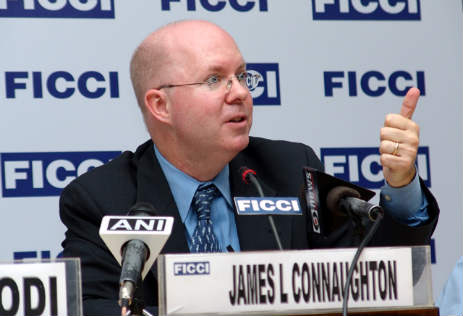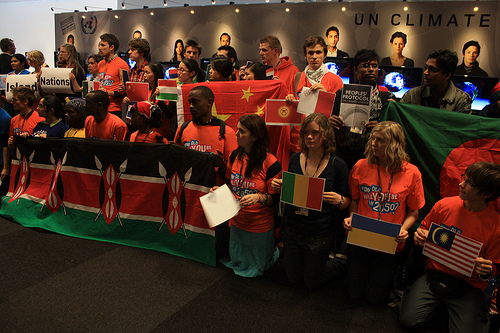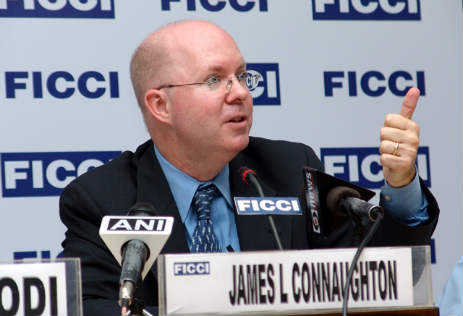COPENHAGEN — To understand how global climate negotiations reached such a troubled state before the U.N. talks began here last week, one could do worse than to look to James L. Connaughton.
 James L. Connaughton headed George W. Bush’s Council for Environmental QualityFile photo / Wikimedia CommonsFor eight years, Connaughton was the top White House environmental adviser to President George W. Bush. So when I saw him at a business summit in Copenhagen last Friday, I asked him about the Bush administration’s responsibility for the climate quagmire—the fact that negotiators haven’t gotten past disagreements that were evident a decade ago.
James L. Connaughton headed George W. Bush’s Council for Environmental QualityFile photo / Wikimedia CommonsFor eight years, Connaughton was the top White House environmental adviser to President George W. Bush. So when I saw him at a business summit in Copenhagen last Friday, I asked him about the Bush administration’s responsibility for the climate quagmire—the fact that negotiators haven’t gotten past disagreements that were evident a decade ago.
“Look, I’m looking to the future,” he said in a sit-down interview. “We could spend a lot of time rehashing the misunderstandings, the misperceptions of what happened in the past, but why don’t we just focus on the future?”
Because the past can shed light on the present and the future, that’s why. And because Connaughton has an interesting interpretation of the past, one that indicates the sort of climate leadership Americans may get if a climate-skeptical Republican is elected to the presidency in 2012 or 2016.
Shortly after the 2000 election, when George W. Bush was asked what how he planned to use the CEQ—the Council of Environmental Quality–he reportedly responded, “What’s CEQ?” Once he learned it was a political arm of the White House created in 1970, Bush appointed Connaughton, a former lobbyist for industrial polluters, to lead it.
At the CEQ, Connaughton helped craft the administration’s energy policy, which also had direct input from energy executives. He traveled to U.N. climate negotiations in Bali and Poland, and argued that the Bush administration intended to act on climate change, despite having rejected the Kyoto Protocol way back in 2001. At the release of a landmark 2007 report from the Intergovernmental Panel on Climate Change, he provided the White House’s response: science was still too uncertain to set a danger level for atmospheric greenhouse gases.
It was his office that was caught doctoring government reports to sow doubt regarding climate change. Phil Cooney, the CEQ’s chief of staff and a former oil industry strategist, edited reports written by scientists, adding the phrase “significant and fundamental” in front of the word “uncertainties” in one example.
“Those allegations were wrong then,” Connaughton said Friday. “They were never proved, so they remain wrong now. But that’s OK. That’s part of the give and take of politics.”
 This year he took a job at Maryland-based Constellation Energy, where he continues to advocate for the energy policies George W. Bush favored—heavy reliance on nuclear power and coal, the latter articulated as support for more research into carbon capture and storage technologies. Constellation sent him to Copenhagen, where he said he is focusing on meeting with other business leaders and participating in events for the Nuclear Energy Institute.
This year he took a job at Maryland-based Constellation Energy, where he continues to advocate for the energy policies George W. Bush favored—heavy reliance on nuclear power and coal, the latter articulated as support for more research into carbon capture and storage technologies. Constellation sent him to Copenhagen, where he said he is focusing on meeting with other business leaders and participating in events for the Nuclear Energy Institute.
Connaughton, 48, said climate change is “absolutely” a proven phenomenon that demands a response. “It’s not a question of whether we need to cut emissions and cut them massively,” he said. “It’s a question of can we find the right policy tools at the domestic level and the international level to do so cost-effectively.”
On the hacked “climategate” emails of University of East Anglia climate researchers, he said, “What those scientists did was reprehensible, but it doesn’t undermine the weight of the actual science that supports taking aggressive action to control greenhouse gases.”
The international action he favors would put a strong onus on developing countries, because they haven’t already built the dirty-energy infrastructure that richer countries possess. I asked if wealthy countries bear a special responsibility to lead a climate response plan because they’ve emitted the most heat-trapping pollutants in the past. Connaughton said that wasn’t the important question.
“There’s no reason why the Chinas and the Indias and South Africas of the world, as they make investments in energy infrastructure, can’t do so with a much lower carbon orientation,” he said
He defended President Bush’s rejection of the Kyoto process for the same reason—it didn’t require enough of developing countries. He said the administration’s eight years were not without international progress on climate change, offering the 2005 Asia-Pacific Partnership on Clean Development and Climate as a key accomplishment. Critics as diverse as John McCain, the Natural Resources Defense Council, and the Brookings Institution believe the partnership was a substance-free PR gimmick, although Connaughton says it led to emissions cuts in energy-intenstive industries such as steel, aluminum, and cement manufactuirg.
Connaughton defended the Bush administration’s domestic climate policies too. He pointed to its work phasing out hydrofluorocarbons, a potent greenhouse gas. He called the 2007 energy bill a bipartisan success for its fuel and appliance efficiency standards, which have since been surpassed by Obama administration standards.
Most of all, he defended the administration’s “ask but don’t require” approach to limiting industrial pollution. He said offering business incentives to reduce carbon dioxide emissions voluntarily was just as effective as ordering them to do so. In fact, he said such incentives should be considered as good as setting a price on carbon—the mother policy that most negotiators in Copenhagen are trying to achieve.
“I’m advantaging a low-carbon source relative to the fossil source, and that puts a price on carbon,” Connaughton said. “I’m talking basic economics. This is not rocket science. Basic economics says you can put a price through an incentive or you can put a price through a regulatory cost or you can do both.”
Few economists would dispute the value of incentives in getting companies to clean up their operations. But it’s misleading to equate incentives with pricing carbon, because it’s the government — not the polluter or the consumer — who eats the cost.
I asked him to help me understand the Republican Party’s uneasy approach to climate change. Why don’t they see it as an opportunity to offer credible policies? Instead, most GOP officials blow off the problem or deny it altogether.
“That’s just so wrong,” he said. “There are very credible conservationists, very credible environmentalists in the Republican Party. Among them, though, they take the time to ask the hard questions about policy design to be sure that the policy is going to work and achieve its goals effectively.”
Connaughton didn’t lack for answers during our interview. And he didn’t show even a hint of remorse for the Bush team’s utter failure on the climate change threat. From everything I’ve seen and read elsewhere, the same is true for other architects of Bush’s domestic and foreign policies–the ones who will find ways back into power with the next Republican president or congressional majority. That’s worth keeping in mind whenever climate-change plans fall apart and we’re told they will be fixed “later.”
Spread the news on what the føck is going on in Copenhagen with friends via email, Facebook, Twitter, or smoke signals.




